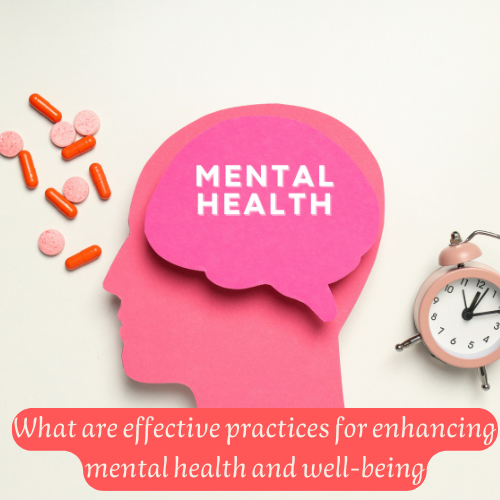Effective Practices for Enhancing Mental Health and Well-Being
Mental health is as essential as physical health, yet it’s often overlooked. Building habits that support emotional and psychological well-being doesn’t just help us get through tough times—it improves our overall quality of life. Let’s explore what it means to nurture our mental health and learn actionable practices to make life more balanced and fulfilling.
Understanding Mental Health
Mental health impacts the way we think, feel, and act. It shapes how we handle stress, connect with others, and make decisions.
What is mental health?
Mental health refers to the emotional, psychological, and social aspects of our well-being. It’s not just the absence of mental illness—it’s about feeling good, functioning well, and coping with challenges effectively. Good mental health doesn’t mean you’re always happy; it means you’re resilient and able to bounce back after setbacks.
Signs of Good Mental Health
Wondering if your mental health is in a good place? Here are some common indicators:
- You can manage daily stress without feeling overwhelmed.
- You experience a sense of purpose and fulfillment.
- You maintain meaningful relationships.
- You can handle unexpected changes without extreme difficulty.
- You approach challenges with confidence and clarity.
When you experience several of these qualities consistently, it’s a sign you’re doing well mentally.
Practices for Enhancing Mental Health
Feeling stuck or struggling with stress? Small adjustments can lead to big changes. Let’s break down simple, effective steps to improve your mental health.
Regular Physical Activity
Ever notice how a brisk walk can lift your mood? Exercise isn’t just good for your body—it’s a mental health booster, too. Physical activity releases endorphins, hormones that reduce stress and improve happiness.
Even just 20–30 minutes of movement a few times a week, like cycling, dancing, or yoga, can work wonders. Don’t worry about hitting the gym daily; find activities you actually enjoy. The goal is to stay active and consistent.
Healthy Eating Habits
“You are what you eat” applies to your mental state, too. The gut-brain connection is real: eating well nourishes the mind as much as the body.
Focus on whole foods like fruits, vegetables, nuts, fish, and lean proteins. Omega-3 fatty acids, found in fish and flaxseeds, are particularly good for brain health. Try to limit processed foods and refined sugars, as they can lead to energy dips and mood swings.
Mindfulness and Meditation
In a world that’s always rushing, mindfulness helps you slow down. Practicing mindfulness means staying present and fully engaging with the moment, whether you’re eating, walking, or simply breathing.
Meditation, even for 10 minutes a day, reduces anxiety, sharpens focus, and promotes relaxation. Simple practices like deep breathing or guided apps can help you get started. Staying consistent is more important than being perfect.
Social Connections
Humans are wired for connection. Loneliness and isolation can take a serious toll on mental health, but relationships provide support, perspective, and joy.
Make time to call a friend, share a meal with family, or join a hobby group. Even small social interactions, like chatting with a neighbor, can uplift your mood.
Sleep Hygiene
Sleep and mental health go hand in hand. Poor sleep can lead to irritability, trouble focusing, and increased anxiety. On the flip side, a restful night strengthens your ability to handle the next day’s challenges.
Stick to a consistent sleep schedule, avoid screens before bed, and create a calming nighttime routine. Dropping caffeine late in the day also helps. Aim for seven to nine hours of quality sleep.
- Skills for the Future Level Up Your Life
- Future-Proof Your Career: 10 Skills to Master in 2025
- From Home Office to Big Profit: Top Remote Jobs That Pay Well
- 20 Side Hustles You Can Start Today to Make Money Online
- Freelance Your Way to Success: Top Online Gigs for Extra Income
- How to Turn Your Hobbies into an Income Stream Online
- Monetag: The Best Alternative to Google AdSense
- How to Start a Successful Blog That Actually Makes Money
- From Home Office to Big Profit: Top Remote Jobs That Pay Well
Seeking Professional Help
Sometimes, building habits isn’t enough. If you’re feeling stuck or overwhelmed, reaching out for professional support can make all the difference.
When to Seek Help
How do you know when it’s time to talk to someone? Here are some signs:
- Persistent sadness that lasts weeks or more.
- Feeling anxious or on edge most of the time.
- Trouble concentrating or remembering things.
- Losing interest in hobbies or daily activities.
- Using alcohol, drugs, or other distractions to cope.
When these feelings interfere with work, school, or relationships, it’s a sign you deserve extra support.
Types of Mental Health Professionals
Not sure where to start? Here’s a quick guide:
- Therapists or counselors: Offer talk therapy to help you work through challenges.
- Psychologists: Provide therapy and may perform psychological testing.
- Psychiatrists: Medical doctors who can prescribe medication for mental health issues.
- Social workers: Trained to help connect you with resources and provide counseling.
Finding the right professional may take time, but it’s worth it. Many offer virtual sessions, making them more accessible than ever.
Conclusion
Taking care of your mental health isn’t selfish—it’s essential. Small steps like regular exercise, eating well, and connecting with loved ones can help you feel more balanced and in control. If things feel overwhelming, don’t hesitate to seek professional help. By prioritizing mental well-being, you’re giving yourself the tools to thrive in every part of life. Start today—your mind will thank you.
